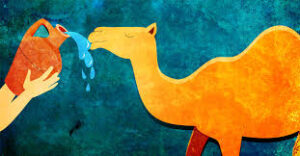O LORD, God of My Master Abraham,
Show Me Success Today
24: 10-14
O LORD, God of my master Abrasham, show me success today DIG: What was the significance of the ten camels loaded down with all kinds of good things from his master? Why stop at the well? What was his plan? Where else do we see this same plan in the TaNaKh?
REFLECT: What can we learn about the importance of prayer from this story? When have you prayed to God asking for a particular sign? How appropriate is this method of praying? Like the chief servant, what specific prayer would you like to see answered in the near future?
The bride was to be taken to the home of Isaac by Abraham’s unnamed chief servant. Then the servant took ten of his master’s camels and left, taking with him all kinds of good things from his master to serve as the bride price. He and his caravan set out for Aram Naharaim, meaning between the two rivers in central Mesopotamia, and made his way to the town of Nahor, or Haran (24:10). No time was wasted looking elsewhere. The journey would have taken at least a month, and he had traveled over four hundred and fifty miles. His camels had traveled a long way, probably hadn’t been watered in several days and were very thirsty.
The caravan stopped and he had the camels kneel down near the well outside the town. It was toward evening, the time the women go out to draw water (24:11). He knew the women would be coming out soon, and this would be the best place to meet them. It was there that he trusted God to give him a specific leading.

How would he know the right one? Abraham had put all his faith in the LORD, and now his servant does also as he prayed with urgency: O ADONAI, God of my master Abraham, give me success today, and show kindness to my master Avraham. See I am standing besides this spring, and the daughters of the townspeople are coming out to draw water (24:12-13). Because of the custom of hospitality toward strangers, he knew that almost any woman would agree to give him a drink of water. Eliezer devised a test. But what if she would voluntarily offer to water his ten thirsty camels? He decided to ask for a specific sign.
He said: May it be that when I say to the woman: Please let down your jar that I may have a drink, she will say: Drink, and I’ll water your camels, too. Her willingness to go the extra mile and offer to water ten camels also, would say a lot about her character, for camels guzzle huge amounts of water. So he continued to pray: Let her be the one You have chosen for your servant Isaac. The chief servant realized this bride was foreordained. By this I will know that You have shown kindness to my master (24:14).
The servant did what Gideon would do years later, put out a fleece (Judges 6:36-40 KJ). It worked for him, but don’t try this at home! This is not the best way for God’s people to determine His will, because the conditions we lay down for God to meet might not be in His will. Here it did, but we might be walking by sight and not by faith, and we may end up tempting God. If we try to put God on a leash and call Him to heel, we will be sadly disappointed. Unlike the prayers of the Psalmists who call on God to be God, to put out a fleece can be manipulative because we get the feeling that we are calling the shots. The fact that He sometimes condescends and accommodates our weaknesses and ignorance is a demonstration of His grace, not a license to play God. He is not obligated to respond to our whims. We don’t have the big picture. He does.385



Leave A Comment